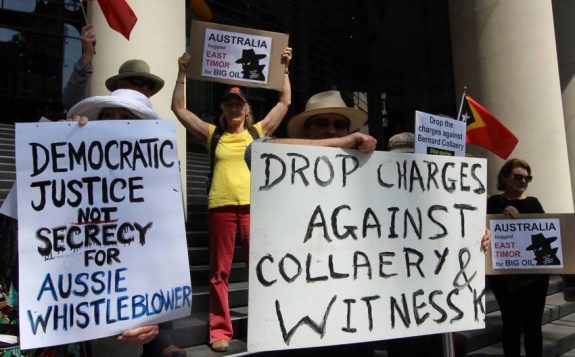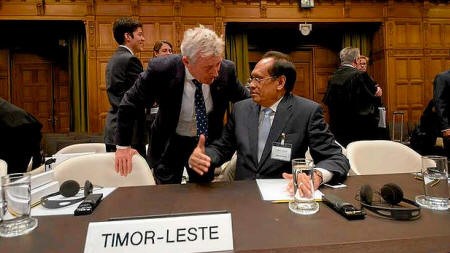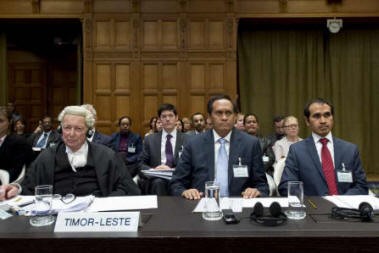The spying on Timor-Leste case … et cetera (part 3)

By Dr George Venturini
(Much of the material in this page is drawn from the work of La’o Hamutuk, the Timor-Leste Institute for Development Monitoring and Analysis, which has monitored and campaigned for Timor-Leste’s rights for two decades. For more detailed information on this and related issues, see www.laohamutuk.org. Current and updated information on the maritime boundary dispute with Australia is at https://www.laohamutuk.org/Oil/Boundary/18ConcilTreaty.htm).
On 23 May 2013 the Australian Broadcasting Corporation radio interviewed Timor-Leste Petroleum Minister Alfredo Pires and Australian Resources Minister Gary Gray. On 26 May Minister Pires informed local media that Timor-Leste was preparing to take Australia to an international court in April 2014, after the C.M.A.T.S. arbitration process was completed.
Much of what followed, certainly until February 2014, is dealt with in G. Venturini, ‘Australia’s Thieving From The Poorest Neighbour: Timor-Leste’, 14 February 2014 Countercurrents.org (Countercurrents Archive February 2014).
On 29 May 2013 The Australian published a piece by Leo Shanahan under the title ‘Aussie spies accused of bugging Timor cabinet’ with additional information about Timor-Leste’s complaint against Australia, and with comments from Timor-Leste Petroleum Minister Alfredo Pires, from his lawyer Bernard Collaery, from former Australian Foreign Minister Alexander Downer and others.
The Australian Broadcasting Commission News reported that the Australian Foreign Minister Bob Carr “insist[ed] that the two countries are good friends,” although he declined to comment on details of the case.
On 4 June 2013 Timor-Leste’s Government issued a statement to the effect that “the overarching relationship between the two countries is and will continue to be one of deep unity, friendship and mutual respect.” On the following day Australian officials confirmed that they had not yet responded to Timor-Leste’s arbitration filing.
The press continued to follow the controversy, with articles in The Economist and The Australian Financial Review, as well as many Timorese newspapers. (‘Timor-Leste and Australia bugs in the pipeline. Timorese leaders push for a better deal from their offshore gas fields’, The Economist, 08 June 2013).
On 19 June 2013 Australia responded, appointing American law professor Michael Reisman as its arbitrator.
It was thought that the change of prime minister the following week would not have significantly altered Australian maritime boundary policies. On 5 July the Australian opposition spokesperson Julie Bishop visited Timor-Leste, displaying her ignorance about the 2006 C.M.A.T.S. treaty.
In October the Timor-Leste and Australian members of the panel selected Argentinean-born Tullio Treves, a former judge of the International Tribunal for the Law of the Sea and Professor at the University of Milan, Italy as the third member and president of the arbitration panel. The three distinguished jurists would have had six months from when they first convene to issue a decision, and this was expected during the second quarter of 2014. The panel heard first arguments on 5 December in The Hague, Netherlands.
Prior to the Australian election of 7 September 2013 its Parliament began an inquiry on Australia’s relationship with Timor-Leste. Submissions urged Australia to respect Timor-Leste’s sovereignty regarding maritime boundaries. Differing views were offered by the Australian Attorney-General and the Resources Ministry, Professor Don Rothwell of the Australian National University, and five oil companies. At a hearing on 21 May 2013 Australian members of Parliament and selected witnesses exchanged ideas and information on the boundary issue, but a better perspective was expressed by Australian National University’s Dr. Joanne Wallis at the hearing the following day: “… until the maritime boundary between Timor-Leste is settled and the exploitation of resources in the Timor Sea is agreed in a mutually satisfactory way there will always be strains in the relationship. … [T]he best way for Australia to improve its relationship with Timor-Leste would be for us to comply with international law as set out in the U.N. Convention on the Law of the Sea and to refer the question of the maritime boundary to an international tribunal, preferably the International Court of Justice. The committee should not underestimate how central the exploitation of resources in the Timor Sea is to the Timor-Leste government’s strategic development planning, or the amount of popular resentment that is present within Timor-Leste concerning Australia’s approach to these resources. Australia is a very wealthy country with one of the highest standards of living in the world. Timor-Leste remains one of the world’s poorest countries where 37 per cent of the population live below the global poverty line. I ask the committee to consider whether Australia is meeting its legal and moral obligations to Timor-Leste when you are preparing your report. Only once we do that will we ever have a truly free, fair and friendly relationship with one of our nearest neighbours.” [Emphasis added]
At another hearing on 24 June 2013, Canberra Friends of Dili tried raise the boundary issue, but the members of Parliament seemed not to be interested. The situation might have changed with the change of government in Australia. The inquiry had concluded but could have been resumed.
To add insult to injury, on 3 December 2013 the Australian media reported that the Australian Security Intelligence Organisation had broken into the Canberra home of Bernard Collaery, a lawyer representing Timor-Leste in the C.M.A.T.S. arbitration case. (‘Lawyer raided over East Timor spying case’, The Australian, 3 December 2013).
Australian agents also detained and searched the home of an Australian retired Secret Intelligence Service agent, a possible whistle-blower who intended to provide “credible direct evidence” of the bugging of the Timorese cabinet rooms in 2004.
The following day there appeared more articles in the Australian press about Australia’s actions (‘Australia’s secret service raids homes of lawyer and ex-spy set to testify’, The Guardian, 4 December 2013) Representatives of the Labor and Green parties began asking questions, and Prime Minister Tony Abbott and Attorney-General George Brandis provided justifying statements.
The Australian newspaper, always sensitive to the interests of private enterprise, editorialise in favour of stealing from Timor-Leste to advance Australia’s political and economic interests. The debates in the Australian Parliament show a range of disparate views.
Lawyer Bernard Collaery, whose offices were raided, explained that the whistleblower had tried to work through channels without results, although Australia’s Inspector-General for Intelligence said that she knew nothing about this, hardly surprising given her office’s limited coverage.
As the initial arbitration hearings began in The Hague, it emerged that Timor-Leste had four whistle-blowing witnesses and had given the government of Australia their names two weeks before.
The Sydney Morning Herald reported that Timor-Leste knows who the 2004 spies were and is disturbed that they had pretended to be aid workers. (T. Allard, ‘East Timor claims it knows which Australian spies bugged its offices’, 9 December 2013).
On 11 December Timor-Leste asked A.S.I.O. to return all materials its officers had seized from Bernard Collaery’s office.
The (Melbourne) Age called Australian spies pretending to be aid workers “beggarly,” and that shameful behaviour was becoming known globally. (‘Eroding the propriety of the Timor deal’, 11 December 2013). For example, British/Canadian columnist Gwynne Dyer’s article ‘Australia’s surveillance of East Timor too shameful to share’ was published worldwide. (G. Dyer, ‘Eroding the propriety of the Timor deal’, Cape Breton Post, 11 December 2013).
On 17 December 2013 Timor-Leste brought Australia before the International Court of Justice, demanding the return of documents taken when A.S.I.O. raided attorney Bernard Collaery’s office three weeks earlier, and The Sydney Morning Herald explained the legal issues. (T. Allard, ‘East Timor to take Australia to International Court of Justice’, 20 December 2013).
Predictably, former Foreign Minister Downer took a defensive position. (J. Kelly, ‘Timor action unwise: Downer’, The Australian, 20 December 2013; Court date set for ASIO’s ICJ case with E Timor, December 21, 2013).
The Court would hear the case on 20-22 January 2014.
On 28 December 2013 The Sydney Morning Herald revealed additional details of the raid on Attorney Collaery’s office a few weeks earlier, including an analysis of the history and motivations of both nations. (T. Allard, ‘Australia accused of playing dirty in battle with East Timor over oil and gas reserves’, 28 December 2013).
At the opening of the year 2014, Australians were reminded of their government’s long-standing duplicity on Timor-Sea oil rights when a 25-year old government memorandum, once declassified – but largely redacted, purported to explain the reasons not to define the maritime boundary. The Sydney Morning Herald reported about the government’s ongoing lack of openness (R. Ackland, ‘George Brandis’ security clean-up leaves out messy questions’, 3 January 2014) and on 10 January the same source explored possible motivations for Australia’s recent actions. (R. Ackland, ‘Joining the dots could produce red faces among our spymasters’, 10 January 2014).
Just before the hearing, the International Court of Justice received a written response from Australia, (Australia, Written observations of Australia on Timor-Leste’s request for provisional measures, 13 January 2014) as well as several bundles of paper from both parties to the case. The documents included many interesting letters and emails between the parties, as well as texts of laws that Australia believed were relevant.

(From left) Attorney Bernard Collaery and Foreign Minister Jose Luis Guterres at the first open ICJ hearing on 20 January in the Hague

(From left) Timor-Leste’s attorney Sir Elihu Lauterpacht, Minister Jose Luis Guterres and Ambassador Joaquim Fonseca
Timor-Leste’s lawyers presented their argument. Essentially they submitted that Australia had engaged in “unprecedented, improper and inexplicable” conduct in the raid on Bernard Collaery’s office, asking that the materials taken be returned or sealed. The Court passed no comment on the statement by the Australian Attorney-General that he had not read them (and, in addition, he promised not to read them!) Many media reported the hearing, including The Sydney Morning Herald, The Guardian and the Australian Broadcasting Corporation. Australia responded on 21 January, Timor-Leste summarised on the morning of 22 January, and Australia did the same in the afternoon. The Court attentively collected their requests and reserved the date for its ruling.
The Guardian described the main issues in the case, (K. Lamb, ‘Timor-Leste v. Australia: what each country stands to lose, As a tiny nation battles in The Hague for oil and gas revenue, Australia’s reputation as a good global citizen is questioned’, The Guardian, 23 January 2014), while Paul Cleary of The Australian wrote: ‘Timor pours oil on spy fire’, 24 January 2014).
By then the Honourable Alexander John Gosse Downer A.C. had moved from the position of Minister for Foreign Affairs – through assisting Woodside – to that of Australian High Commissioner to the United Kingdom, a post that he would cover from 2014 to 2018.
On 28 January 2014 the Court issued an Order denying Australia’s request to suspend the proceedings until the arbitration case was decided. The Order accepted Timor-Leste’s request to keep the case going and set a schedule for Timor-Leste to file written arguments by 28 April and Australia to respond by 28 July, with further proceedings to follow. The court was to decide on Timor-Leste’s request for provisional measures on 3 March.
On 3 March 2014 the International Court of Justice issued a preliminary Order for provisional measures, accepting most of Timor-Leste’s claims but declining to instruct Australia to return the seized materials. Twelve of the 16 judges ordered that: 1) Australia would ensure that the content of the seized material was not in any way or at any time used by any person or persons to the disadvantage of Timor-Leste until the case had been concluded; and 2) Australia would keep under seal the seized documents and electronic data and any copies thereof until further decision of the Court. There were four dissenting and one separate opinions.
Fifteen of the judges (all except for Australian-appointed judge ad hoc Ian Callinan) ordered that Australia was not to interfere in any way in communications between Timor-Leste and its legal advisers in connection with the pending Arbitration under the Timor Sea Treaty of 20 May 2002 between Timor-Leste and Australia, with any future bilateral negotiations concerning maritime delimitation, or with any other related procedure between the two States, including the case before the Court.
The decision was provisional and only related to Timor-Leste’s request for “urgent measures,” and “in no way prejudge[d]” the final outcome which would have taken at least six months more.
In the meantime, the C.M.A.T.S. arbitration case was proceeding in The Hague. On 18 February 2014 Timor-Leste presented its first substantive arguments and evidence. Australia was to respond on 19 May, and a second round of submissions from Timor-Leste (by18 July) and Australia (by 18 August) was to provide the basis for hearings from 27 September to 2 October before the final ruling.
On 23 February the A.B.C. Radio National’s ‘Background briefing’ aired a 40-minute documentary examining the details of the espionage during 2004-2005. During the programme Professor Donald K. Anton from the Australian National University explained that “if the [eavesdropping] allegations prove true, Australia is in an unenviable and dubious position of being the first state of having a treaty it negotiated declared invalid on account of its fraud.”
On 17 March the A.B.C. Four Corners aired the documentary ‘Drawing the line’ on the issues, mainly emphasising the Australian government’s closeness to the oil companies.
Up to that point, Timor-Leste had spent close to $ 20 million in legal fees for the cases – including $0.8 million in March 2014, and expenses would have continued. The $11.8 million spent in 2013 exceeded the $10 million budgeted for legal services that year, and the expenses in 2014 were to amount to more than the $10 million appropriated.
In addition to legal fees, Timor-Leste spent significant amounts on travel, consultants, and government officials’ time.
On 19 March 2014 Prime Minister Xanana Gusmão addressed the Jakarta International Defence Dialogue. He told the assembled dignitaries, including those from Australia: “However, in order for this cooperation [on maritime security] to be honest and serious, it is vital that we determine the maritime borders between countries, under international law, in a clear manner without subterfuges of any kind. It is truly offensive to see how some countries, because they are large, wealthy or heavily armed, are always the ones that are more unfair to their neighbours, particularly when those neighbours are small and poor. [Emphasis added] International law is always invoked, in the pronouncements made in relation to other countries. But international law is simply relegated or forgotten, when it is to ensure major economic benefits at the expense of the principle of fair policy and of the universal values of equal rights and obligations between peoples and nations.”
The Australian online human rights magazine Right Now published several relevant articles which were on the same tone. The titles were quite indicative: Timor’s Oil, Bugged: Espionage in East Timor, Walking together: ‘Australia’s chequered history in Timor-Leste’, ‘Having it both ways: Australia’s conflicted position in the Timor Sea’, and ‘Cutting the Gordian knot – Solving the East Timor v Australia dispute.’
On 1 April The Sydney Morning Herald cited Timor-Leste’s lawyers as saying that a January letter from Australia to Timor-Leste supporting ConocoPhillips in the Bayu-Undan tax dispute linked the tax cases to the C.M.A.T.S. arbitration then in process, inadvertently strengthening Timor-Leste’s request for arbitration under the Timor Sea Treaty.
Later in April 2014 the C.M.A.T.S. arbitration panel ordered Australia to allow the ex-A.S.I.S. whistle-blower to provide evidence to their proceeding. Australia had cancelled the former agent’s passport four months earlier in an effort to prevent him from travelling to testify to the panel, but technology could allow other options.
Continued Wednesday – The spying on Timor-Leste case … et cetera (part 4)
Previous instalment – The spying on Timor-Leste case … et cetera (part 2)
 Dr. Venturino Giorgio Venturini devoted some seventy years to study, practice, teach, write and administer law at different places in four continents. He may be reached at George.venturini@bigpond.com.au.
Dr. Venturino Giorgio Venturini devoted some seventy years to study, practice, teach, write and administer law at different places in four continents. He may be reached at George.venturini@bigpond.com.au.
Like what we do at The AIMN?
You’ll like it even more knowing that your donation will help us to keep up the good fight.
Chuck in a few bucks and see just how far it goes!










3 comments
Login here Register here-
LambsFry Simplex.
-
Roswell
-
LambsFry Simplex.
Return to home pagedown down,
deeper and down..
I think we’ve reached status quo, LambsFry.
It’s a long way where I’ve been, Roswell.
In consideration of amount of research, readings, linx etc, interesting see if any usual suspects turn to call him dill or worse.